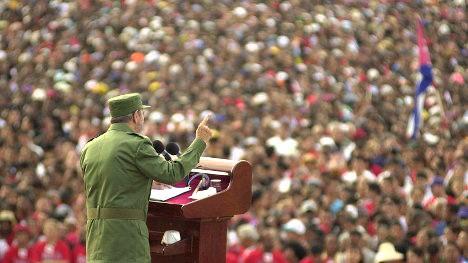Havana, Cuba: Present today are the words of the leader of the Revolution, Fidel Castro, 21 years ago, when he addressed the comprehensive program known in Cuba as the Battle of Ideas, the seed of the transformations that the country is now undertaking.
Fidel Castro recalled the claim made 15 months and 16 days earlier for the return of the child Elián González, held in the US state of Florida without the consent of his father.
The campaign for the return of the six-year-old boy, who was shipwrecked on a boat along with other people in an attempt to reach the United States, filled the streets and culminated after legal and political disputes with his arrival on the Caribbean island in the arms of his parent.
That epic accentuated the field of ideas as the fundamental one in the confrontation with the political adversary, at the same time that it implied a strategy of development towards the interior of society, as the journalist Julio García Luis evokes in his book The Cuban Revolution, 45 great moments.
In Fidel Castro’s opinion, it was “the largest mass mobilization” that the country’s history had known and “the spark that ignited the struggle”, because just three years after those events, the Revolution specified 150 new social plans.
Each new program led to the discovery of another, which is why problems such as crime, the separation of study and work, the improvement of social justice, the promotion of culture began to be detected and investigated, explains Luis.
And it seems that he is speaking in the present tense of the transformation plan that Cuba is implementing today in vulnerable neighborhoods and communities.
In his speech that March 31, 2001, Fidel Castro made reference to some of those actions of the Battle of Ideas, such as the emergence of the Round Table television program and the University for All and the inauguration of the Instructor Schools of Art.
“Nothing and no one will be able to stop our destiny, neither through weapons, nor through ignorance,” the leader said.
In addition, it reinforced the island’s resistance to a history marked by the United States blockade, a mercenary invasion, biological warfare, all imaginable methods of subversion, hundreds of attempts to decapitate the political process by assassinating leaders, among other aggressions.
More than 20 years have passed since his speech and, far from diminishing, the economic suffocation measures increased in the midst of the worst health crisis in recent years, while combining that strategy with actions to cause destabilization through the use of social networks as the main political instrument.
“Cubans can feel proud of the historical responsibility acquired by our people in their long struggle for freedom and justice,” Fidel Castro stressed at the time, and these are words that seem written for today’s hours.

